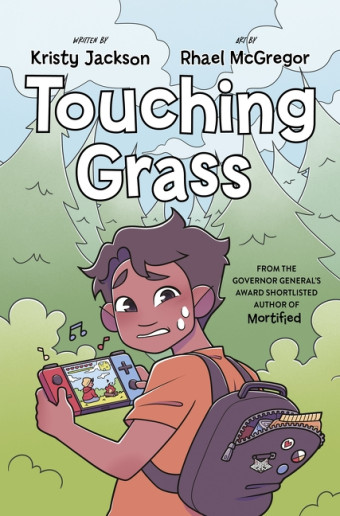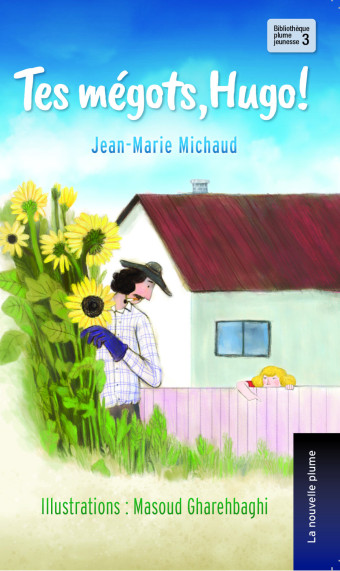Kristy Jackson, a Saskatchewan-based author of Cree, German, and Scottish descent (and a member of the Whitefish Lake First Nation #128, Treaty 6), gifts readers young and old with a beautiful story showing the power of connection on the mind, body, and spirit.

- Touching Grass
- Kristy Jackson, Rhael McGregor (Illustrator)
- HarperCollins
- $21.99 Hardcover, 336 pages
- ISBN: 978-14-43472-23-4
In her latest novel for middle years readers, Touching Grass, Jackson introduces 12-year-old Tristen, who, after getting in trouble at school, is sent to a culture camp where he processes many important feelings and experiences, such as grief, bullying, and connecting to identity.
Tristen’s mischievous yet self-aware inner dialogue quickly validates the contemporary struggles of both parents and youth. As the story unfolds, readers are taken on a refreshing and sensory journey where the main character connects to all that is nature and the medicine of the land.
Each chapter opens with graphic novel–style illustrations by Winnipeg-based Métis artist Rhael McGregor, giving the reader an intriguing preview of what the chapter holds. Jackson commends McGregor for their incredible artwork and their contribution to bringing her story alive both in Touching Grass and in her first book, Mortified.
“Their work is stunning, and I’m so lucky to have them on the team,” she says.
Jackson has worked for Denesųłinę communities in Saskatchewan’s far north since 2011, and after attending a culture camp near Black Lake Denesųłinę First Nation, she was motivated to share her experience.
With a great deal of research, and consultation with and support from Ronelda Robillard and Rosalie Tsannie-Burseth of Hatchet Lake Denesųłinę First Nation in Treaty 10 Territory, Jackson was able to honour the Dene language and teachings throughout Touching Grass.
“These ladies did a lot of work to help me make sure my book was culturally accurate and respectful, and I’m eternally grateful to them for their contributions, support, and enthusiasm for this story,” she says of the women who each wrote a foreword to the book.
_800_533_90.jpg)
Jackson recognizes the importance of cultural representation. In her job at Athabasca Basin Development, she’s helped to run a book program where each Christmas, they help Santa give every child in seven remote communities a gift and a book by an Indigenous author.
“I didn’t see very many books that represented that particular area and language,” says Jackson.
“It’s so important for kids to see themselves in books, and I wanted to give the kids in those communities a book for them. My dream is that maybe this book will encourage writers from the North to write their own stories to share with the world.”
In Touching Grass, Jackson not only uses the language of and issues facing today’s youth, but also weaves these topics together with ancestral wisdom and traditional teachings. Through the portrayal of Indigenous kinship, love, and humour, Jackson gently delivers an important lesson about seeking balance.
“A lot of parents worry about their kids who play a lot of video games and spend a lot of time on screens. I think technology is a great thing, and video games are a lot of fun, but we all need to go outside and ‘touch grass,’ too,” says Jackson.
“There’s room for both in a balanced, modern-day life.”












